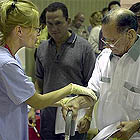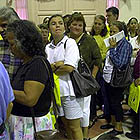|
 |
|
Esta página no está disponible en español. Orlando SentinelBusy Clinic Takes Pulse Of Health Care For HispanicsBy Sandra Pedicini
June 23, 2002
(GARY W. GREEN/ORLANDO SENTINEL) Josephine Mercado was a happy victim of her own success Saturday. So many people mobbed the Hispanic health fair she organized that volunteers ran out of forms for them to fill out. A line for cholesterol screenings snaked through the Marks Street Senior Center, and those who joined it could expect an hourlong wait. Mercado was glad so many people showed up, though she fretted that the turnout could overwhelm the volunteers, and some people might not get tested. All this on the kind of rainy Saturday that makes people want to stay home and be lazy, not to stand in line to get stuck with needles. "I'm glad they came," Mercado said Saturday, taking a quick break in between rushing from place to place, making sure everything was going smoothly. The turnout signifies a need in the Hispanic community for better health care, she said. ---------- (GARY W. GREEN/ORLANDO SENTINEL) Mercado, an attorney, helped teach women about breast cancer in New York before moving to Orlando and founding Hispanic Health Initiatives two years ago. Saturday's health fair was the group's first. Studies have shown that minorities in general get worse health care than white non-Hispanics, even when income levels are the same. Among the issues Hispanics face: Sorting out emergency-room red tape can be difficult for anybody, let alone someone who can't speak the language well. Those who work in low-paying jobs may have inadequate insurance or none. There are cultural issues, too, Mercado said. "We're a community that has yet to learn what it's all about when it comes to preventive medicine," she said. She guessed that most people attending Saturday's event had no insurance. Several said they don't see a doctor regularly. Retiree Luis Pagan moved to Orlando a year ago from Puerto Rico and has yet to find a doctor he likes. One sent his wife, Justina, to the emergency room rather than treat a rash she had, Pagan said. Another ordered expensive tests Pagan didn't think he needed. "I'm not a rich man. I'm a retiree," he said. "Their interest is more money than anything else." Where he's from, he said, "the doctor is more patient-oriented." Justina Pagan, who speaks just a little English, had an interpreter from Orange County Fire and Rescue to help her understand results of her cholesterol screening. The news, unfortunately, wasn't good. Blood sugar: too low. Cholesterol: too high. She needs to cut out eggs and butter and consider cholesterol-lowering drugs. "No meat, no this, no that," she said. Luis Pagan couldn't understand it. The couple walks 2 miles every day. And Justina Pagan is a healthy eater. "She must have a cholesterol factory inside," he said. His only complaint about the event: "There's too many people here." With her 6-month-old daughter sleeping beside her in a stroller, Gisela Morales stood in line for a half-hour waiting for a cholesterol screening. It looked as though she'd have to wait at least that much longer. Gina Sanchez, 21, passed the time by reading a Dean Koontz book. She came with her mother, Gladys, who doesn't have health insurance. Mercado got the word out about the event through newspapers and Spanish-language radio stations. Churches put out fliers. That's how one group getting tested for the ulcer-causing H. pylori microbe heard about the event. They ate tiny cans of Boost pudding, which causes a reaction that helps test results, then blew into plastic bags. Contents are tested for carbon-dioxide levels. Like some other health problems, H. pylori infections, thought to be a cause of peptic ulcers, tend to strike minorities more often. People taking the H. pylori test had to fast for four hours beforehand. To replenish them when they finished, volunteers handed out fruit, juice and sancocho, a Puerto Rican vegetable-filled hen soup. "That was the idea, eat something healthy," Mercado said. "I don't want people fainting."
|

 ----------
----------